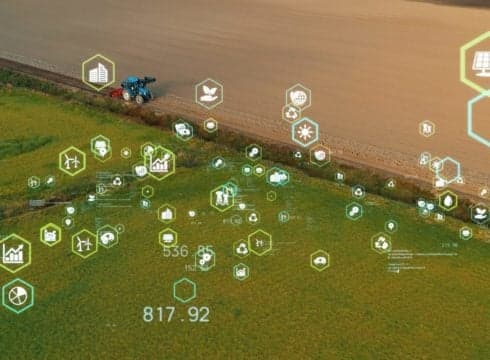Technologies such as satellite imagery, AI, Information Technology, and many more when joining hands with agriculture, make the entire process predictable, sustainable and seamless
The current market conditions and the environmental crises experienced globally have forced Agri-stakeholders to rethink their agriculture operations and decisions
With real-time data and big data analytics, it has made it possible for agri-stakeholders to effectively manage their farms and also conclude better decisions related to agriculture
Inc42 Daily Brief
Stay Ahead With Daily News & Analysis on India’s Tech & Startup Economy
Today even when the Indian Economy has seen a rise, this has still not improved agriculture’s contribution to the nation’s GDP. The agriculture sector occupies a large share of the Indian Economy. Even today over 70% of Rural Households still rely largely on Agriculture for their livelihood. Agriculture accounts for 25% of India’s GDP and is a key contributor to the Indian economy.
This sector today is undergoing a major transformation and emerging at a better place with the help of technological advancements such as Sustainable Farming Practices or Farm Management Software. Traditionally making decisions related to agriculture was unreliable because of erratic climatic conditions which couldn’t provide a solid ground for any agriculture-based decisions.
Today although the sector has been through some major technological advancements and this has given a solid ground, based on which agriculture-related decisions could be made. Big Data over the years has become a reliable source, the sector no more only relies on human labour, human intuition and traditional agriculture practices. It has actively started adopting technologies such as AI, IoT, IT, Climate Smart Advisories, and so on.
Sustainable Agriculture
Sustainable Agriculture has grown popular in recent times. Gone are the times where relying on intuition or traditional agriculture practices was the best option. Today with the ever-growing population, traditional agriculture practices are not only necessary but are also not worth it. Technologies such as Satellite Imagery, Artificial Intelligence, Information Technology, and many more when join hands with agriculture, they make the entire process Predictable, Sustainable and Seamless. The key is to scout the best blend of traditional and new-age agricultural practices to maximize long-term yield while staying within resource restrictions.
India has been actively adopting sustainable agriculture practices since 2014-15, the focus heavily was laid upon water and soil health management along with climate impact, and so on. The Pradhan Mantri Krishi Sinchai Yojana, initiated in the year of 2015 was set with an aim to improve farming as a process. Today where states like Sikkim or Andhra Pradesh lead sustainable agriculture in India, the adoption still is on its margin level.
With such initiatives taken, many farmers now have deeply understood the repercussions and have refused to use chemical pesticides as a part of a growing movement, that favours natural alternatives. Non-Pesticide Management is a Sustainable approach to pest control operating on the theory that an infestation of one type of insect could create a disturbance in the environment. We are now targeting the root of the problem and not only the symptoms.
Within a year of using natural methods, farmers experienced a far better result than they had ever experienced. And as the word spread, more farmers and agri stakeholders came on board. Sustainability is not only a matter of survival, it encompasses more than the habitat’s degradation.
Earlier before Sustainable Agriculture practices were put to use, various other forms of agriculture practices were being used by agri-stakeholders, such as Industrial Agriculture, Intensive Farming, Sedentary Agriculture, Shifting Agriculture, Arable Farming, and so on, these severely affected the environment and eventually disrupted it.
Industrial Agriculture
Industrial Agriculture also known as Commercial Agriculture involves crops that are genetically modified with heavy use of pesticides and this practice results in environmental destruction on a large scale. Industries have reaped benefits and enjoyed profitability without paying attention or understanding the various repercussions that their farming activity held over the environment all these years. Soil Erosion, Infertility, Loss of Biodiversity, Increase in Greenhouse Gas Emissions, Pesticide Overuse, Water Shortage were a few problems that Industrial Agriculture over the years have contributed to.
Such improper practices could be addressed with proper adoption of technology and can result in the upliftment of the agriculture sector and the environment overall. The current market conditions and the environmental crises experienced globally have forced Agri-stakeholders to rethink their agriculture operations and decisions. Which has further led to the strong growth of Agritech.
The Rise Of Agritech
AgTech or Agritech refers to technology-focused improvements within agribusinesses. It holds the power to eliminate the negative global environmental impact of agriculture by reducing the use of fertilizer and other chemicals required for food production. It adopts sustainable agriculture practices with the help of technologies that helps agri-stakeholders enjoy better yield and profitability by the end of their cycle.
Agritech today has brought all Agri-Stakeholders on a single platform through a seamless and effective collaboration amongst them. With real-time data and big data analytics, it has made it possible for agri-stakeholders to effectively manage their farms and also conclude better decisions related to agriculture, furthermore helping with effective farm planning and resulting in a better yield by the end of the cycle. Today it has made it possible for farmers to enjoy a steady income, a better quality of yield by the end of their respective harvest cycle, and with lesser wastage of resources.
{{#name}}{{name}}{{/name}}{{^name}}-{{/name}}
{{#description}}{{description}}...{{/description}}{{^description}}-{{/description}}
Note: We at Inc42 take our ethics very seriously. More information about it can be found here.


